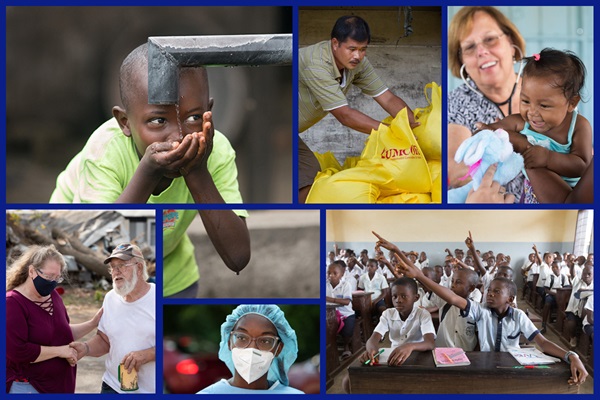United Methodists clearly hear our call as disciples of Jesus Christ to love our neighbors as ourselves and bear one another's burdens. Together, by sharing our resources, United Methodists support remarkable ministry around the world.
The United Methodist Church's special giving structure ensures that together our gifts bless as many people as possible in sustainable, strategic ways. Every contribution makes a difference in this important work.
There are five primary ways United Methodists fund mission beyond the local church:
"Funding is mission, an expression of our stewardship, and an expression of our connectedness." — Bishop L. Jonathan Holston
1. Through the apportioned funds.
United Methodists know apportionments by many names, such as “a portion meant for others” or various types of covenants — connectional, ministry share, missional giving, shared ministry and tithe.
Through the apportionments, essentially shared mission, each local church contributes a small portion of its tithes and offerings to support vital international, national and regional missions and ministries.
At any given time, this funding helps build churches, support missionaries, advocate for the underserved and marginalized, improve global health, educate leaders, resource ministries with youth, women and men, provide communication and outreach tools for local churches, and so much more.
This shared giving also funds conference mission work engaged by leaders and partners within each annual conference.
2. Through Special Sunday giving.
On six Special Sundays each year, The United Methodist Church highlights critical ministries that work to empower people around the world. These designated funds support racial- and ethnic-minority communities, strengthen Native American ministries, churches and clergy, provide scholarships for students, and support programs that work for peace, love and compassion.
In addition to the six churchwide Special Sundays, each annual conference celebrates an additional five Sundays that support Christian education, health and welfare, rural life and disability ministries. Visit your local conference website to learn more.
3. Giving through The Advance network.
The United Methodist Church created a giving channel designated to fund missional work and projects supported by the denomination and called it The Advance. Since 1948, this giving channel has raised funds that positively effect change within communities and empower individuals around the world.
Through “above and beyond” giving, members and congregations can support disaster relief, water supplies, health care, evangelism, agricultural training, children’s welfare, education at all levels, advocacy for women, economic development, prison and transition-from-prison ministries, and Bible distribution. See the whole range of possibilities online and in The Advance Catalog.
Conference Advance gifts provide ways for individuals or congregations to fund individual projects, institutions or programs related to the mission work of the conference, but not included in the conference budget. Check your conference website or with your conference treasurer to find out more about giving opportunities for ministries within the bounds of your conference.
4. Through relationships with missionaries.
Covenant Relationships provide support for more than 350 Global Ministries missionaries serving in more than 60 countries. Individuals and churches can partner with a missionary and provide financial, spiritual and emotional support. Learn about missionaries you can support through the Global Ministries online listing. Learn more about the Covenant Relationship.
Or engage in a deeper level of relationship through In Mission Together partnerships, which are normally sponsored through the annual conference. Check your conference website or ask your district superintendent for more information.
5. Through individual donations or bequests to United Methodist agencies or related institutions.
Designated direct gifts help general agencies, annual conferences and related institutions extend vital ministries and pursue key initiatives that are not supported through apportionments. Undesignated direct gifts can also be used as reserve funds and made available to support new projects not included in the original budget plans.
Through our collective contributions to shared mission and designated gifts to specific ministries, United Methodists do together what we cannot do alone to effect change around the world, all in the name of Jesus Christ.
This content was produced by Ask The UMC, a ministry of United Methodist Communications.





